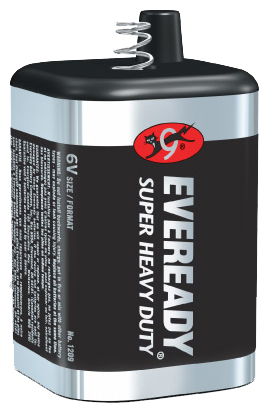
It can be hard to know what you’re looking at when it comes to zinc based batteries, because the terminology can get mixed around a little. Here’s some clarity:
- If someone refers to the Leclanché cell, they mean zinc-carbon.
- If someone refers to heavy duty zinc-carbon (or extra heavy duty or super heavy duty), they mean zinc-chloride.
- If they are the cheapest battery in the shop and they don’t say what chemistry they are, then they are probably zinc-carbon batteries.
What’s the difference?
Cost
In chemical terms, Zinc-chloride uses purer materials, making it slightly more expensive to manufacture.
Discharge
Eveready’s own comparison shows this stark difference when it comes to rates of discharge. When fitted to a high drain device such as a motor toy, zinc-chloride will last 3 times longer than zinc-carbon. When powering a low drain device such as a radio, zinc-chloride is 180% better. As such, when considering the cost-benefit, it very much depends on what sort of device you will be using the battery in.
In short, the higher the drain, the better the performance of zinc-chloride compared to zinc-carbon when using the same size battery. This is only because the zinc-carbon units have a higher internal resistance (which wastes energy), during high rates of discharge. As such, a large zinc-carbon battery can have a similar performance to a smaller zinc-chloride unit (and a similar cost), because the bigger product has a lower internal resistance.
Cell Voltage
Zinc-chloride also offers a marginally higher cell voltage (1.6 volts) compared to zinc carbons 1.55 volts, but in most applications this is so slight any difference in performance is not noticeable.


What about mixing? Zinc with Alkaline is obviously not recommended but is it “okay” to mix zinc carbon with zinc chloride batteries?
I would not mix chemistries, even elementary ones like Zinc Carbon (General Purpose) and Zinc Chloride (Heavy Duty). Zinc Chloride has about 50% greater capacity and a higher current output over the Zinc Carbon battery. That being said they are going to perform very odd together to where a touchy instrument may not operate precisely or damages could occur. Not to mention the Zinc Chloride will over-power the Zinc Carbon batteries, decreasing life or causing issues that cause the battery to possibly be dangerous.
My clock specifies a carbon zinc battery but can I use a carbon chloride battery without worry ?